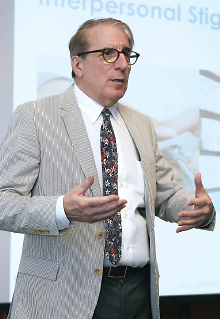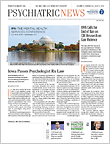Psychiatrists can help lesbian, gay, bisexual, or transgender individuals by ending their invisibility, said Harvey Makadon, M.D., at APA’s 2016 Annual Meeting in Atlanta.
“Psychiatry has a long history of ignoring or demeaning homosexuality,” said Makadon, a professor of medicine at Harvard Medical School and director of education and training programs at the Fenway Institute in Boston. He was joined by APA Leadership Fellow Jeremy Kidd, M.D., M.P.H., a PGY-3 at Columbia University.
Clinicians can begin reversing that history by first being aware of the complexities of gender identity and sexual orientation and then by educating themselves and their staffs on ways of creating a safer culture for their patients.
Gender identity is the internal sense of the person’s gender—male? female? both? neither? Gender expression is how people “present themselves by means of behavior, mannerisms, speech patterns, dress, or hairstyles.” Sexual orientation addresses the way a person identifies his or her physical and emotional attraction to others.
“You cannot assume someone’s gender or sexual orientation by how the person looks or sounds,” he said.
Transgender people—the T in LGBT—are those who perceive that their gender identity is not congruent with the sex they were assigned at birth.
All of these characteristics are not absolute but may lie along a spectrum, said Makadon. “Intersectionality,” the individual’s collection of various identities, can complicate things even more, he noted, citing the dilemma of black gay men who encounter homophobia in the black community and racism in the LGBT community.
Health care disparities affect LGBT patients as they do other minorities or marginalized groups, said Makadon. Disparities are caused by stigma and discrimination, and stigma can be interpersonal or structural.
Structural stigma “includes the policies of government or private institutions that intentionally or unintentionally hinder the opportunities of certain groups.”
Stigma can also be intrapersonal, when individuals internalize the discrimination they face in the world around them. That can lead to stress, anxiety, or depression. Effects also include greater risk of contracting HIV, delays in seeking both preventive and acute care, and poor adherence to treatment.
Disparities persist throughout the lifespan, said Makadon. LGBT individuals have two to three times the rate of suicide attempts of the general population, higher usage of tobacco and alcohol, greater victimization, and are less likely to be insured. Among their elderly peers, there is more isolation, less family support, and a lack of social and support services.
Caring for these patients involves a thoughtful approach with some awareness of their identities and self-perception as well as their health needs.
“You are almost certainly not the first health care staff person an LGBT person has encountered,” he said. “So if the patient has experienced insensitivity, a lack of awareness, or discrimination, he or she may be on guard or ready for more of the same thing.”
Defusing that anxiety and opening the door to therapeutic engagement can begin by using gender-neutral language and asking the patient about the name and pronouns by which they prefer to be called. Realize that the name on the insurance card may not match the apparent identity of the person in the exam room. As with any patient, it is important to take a history of sexual health. Train all staff members to be respectful.
“If necessary, apologizing when patients have uncomfortable reactions, even if what was said was well intentioned, can help defuse a difficult situation and reestablish a constructive dialogue about the need for care,” he said. ■

